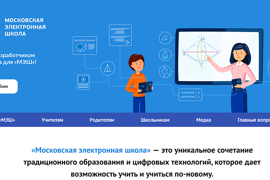
Moscow is recognized as one of the world leaders in equipping schools with digital infrastructure. The largest international consulting company Boston Consulting Group (BCG) has published a study comparing the digital environment in secondary educational institutions in 11 major cities of the planet. The Russian capital has taken a leading position in the ranking due to the effectiveness, equipment and uniqueness of digital services.
Moscow entered the top three in terms of digital equipment along with Singapore and Tallinn. Back in 2018, all schools in the capital had interactive panels, Wi-Fi, laptops for teachers, and many other technical aids that help in the learning process. According to researchers, Moscow has managed to create a unique digital environment, providing students with wide access to education. The city has one of the largest school systems in the world, Moscow is among the best in the world ratings of PISA (an international program for assessing educational achievements).
The experts highlighted the unique educational platform MES (Moscow Electronic School). Such systems exist only in four out of ten cities participating in the comparative analysis – in Singapore, Toronto, Stockholm and Los Angeles. Since its foundation in 2016, MES has become one of the main digital platforms for metropolitan education. The system contains more than 50 thousand lesson scripts, about nine thousand video lessons, almost two thousand electronic teaching aids, 348 textbooks, about 140 thousand educational interactive applications, 11 unique laboratories, and 245 works of fiction. Since last year, users from all over the world have gained access to MES.
Now MES is developing in three directions. Firstly, thanks to it, students can study the subject of interest to them anywhere and at any time. Secondly, MES helps teachers to make the learning process more interesting and informative and at the same time is a platform for professional development. Third, the platform creates a digital environment for the educational process and increases the efficiency of educational resources.
The digital environment has helped Moscow education seamlessly switch to distance learning during the coronavirus pandemic. From the first days of quarantine, teachers and schoolchildren received access to all information resources. During the distance, 87% of teachers rated the equipment of their remote workplace as good or excellent. Teachers who did not have the necessary gadgets for conducting classes were given 234 thousand devices.

